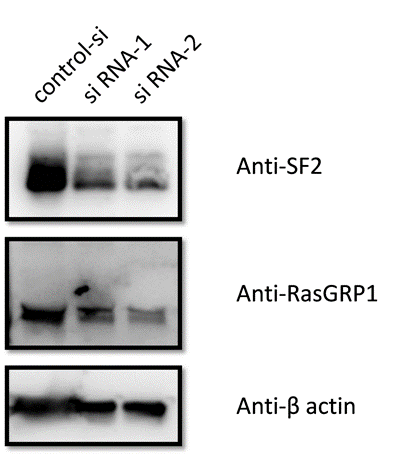Session Information
Session Type: Abstract Submissions (ACR)
Background/Purpose: Down-regulation of MAP kinase pathway has been recognized in T cells from patients with SLE that results in hypo-methylation of DNA. RasGRP1 is an intracellular signaling protein highly expressed in T cells and activates the Ras signaling pathway downstream of TCR engagement. RasGRP1 deficient mice develop late-onset lymphoproliferative autoimmune syndrome. Previously we reported that defective (alternatively spliced) RasGRP1 transcripts correlate with lower levels of RasGRP1 protein in SLE T cells. Serin/arginine-rich splicing factor1 (SRSF1) is a member of the serine arginine family of splicing proteins that binds pre-mRNA to regulate alternative splicing. For instance, SRSF1 binds to the 3’UTR of CD3 zeta and enables normal splicing of this signaling protein. (Moulton V et.al. J Biol Chem. 2010). The purpose of this study is to determine the relationship between aberrant splicing of RasGRP1 and SRSF1 expression in SLE T cells.
Methods: Forty-five SLE patients and eighteen healthy subjects were included in this study. T cells were collected from peripheral blood of each subject and RNA was isolated. Expression levels of SRSF1, normally spliced RasGRP1 and DNMT1 transcripts were assessed by real time quantitative PCR. Immunoprecipitations (IP) were performed to confirm the direct binding of SRSF1 to RasGRP1 mRNA. SRSF1 specific siRNA was used to supress the expression levels of the RasGRP1 in Jurkat T cell.
Results: Expression levels of SRSF1 transcripts were significantly lower in SLE patients compared with healthy subjects (p=0.001, t-test). In patients with SLE, expression levels of SRSF1 correlated with those of normally spliced RasGRP1 and DNMT1 (r=0.517, p=0.023 [RasGRP1]; r=0.557, p=0.013 [DNMT1]). IP studies suggested that SRSF1 binds directly to RasGRP1 exon11 RNA. RasGRP1 protein level was decreased in Jurkat T cell when exposed to SRSF1 specific siRNA (Figure).
Conclusion: SRSF1 binds to RasGRP1 mRNA and controls its expression. Low SF2/ASF levels in SLE T cells correlate with the expression levels of RasGRP1 and DNMT1. We propose that SRSF1 regulates the alternative splicing of important genes in SLE T cells including RasGRP1 and CD3 zeta.
(2238+250 < 2750 characters, one figure = 250 characters)
Figure
Disclosure:
T. Kurita,
None;
S. Yasuda,
None;
V. Moulton,
None;
Y. Shimizu,
None;
M. Kono,
None;
H. Koide,
None;
K. Oku,
None;
T. Bohgaki,
None;
O. Amengual,
None;
T. Horita,
None;
G. C. Tsokos,
None;
T. Atsumi,
None.
« Back to 2014 ACR/ARHP Annual Meeting
ACR Meeting Abstracts - https://acrabstracts.org/abstract/decreased-levels-of-srsf1-serinarginine-rich-splicing-factor1-induced-lower-levels-of-rasgrp1-in-t-cells-from-patients-with-systemic-lupus-erythematosus/

